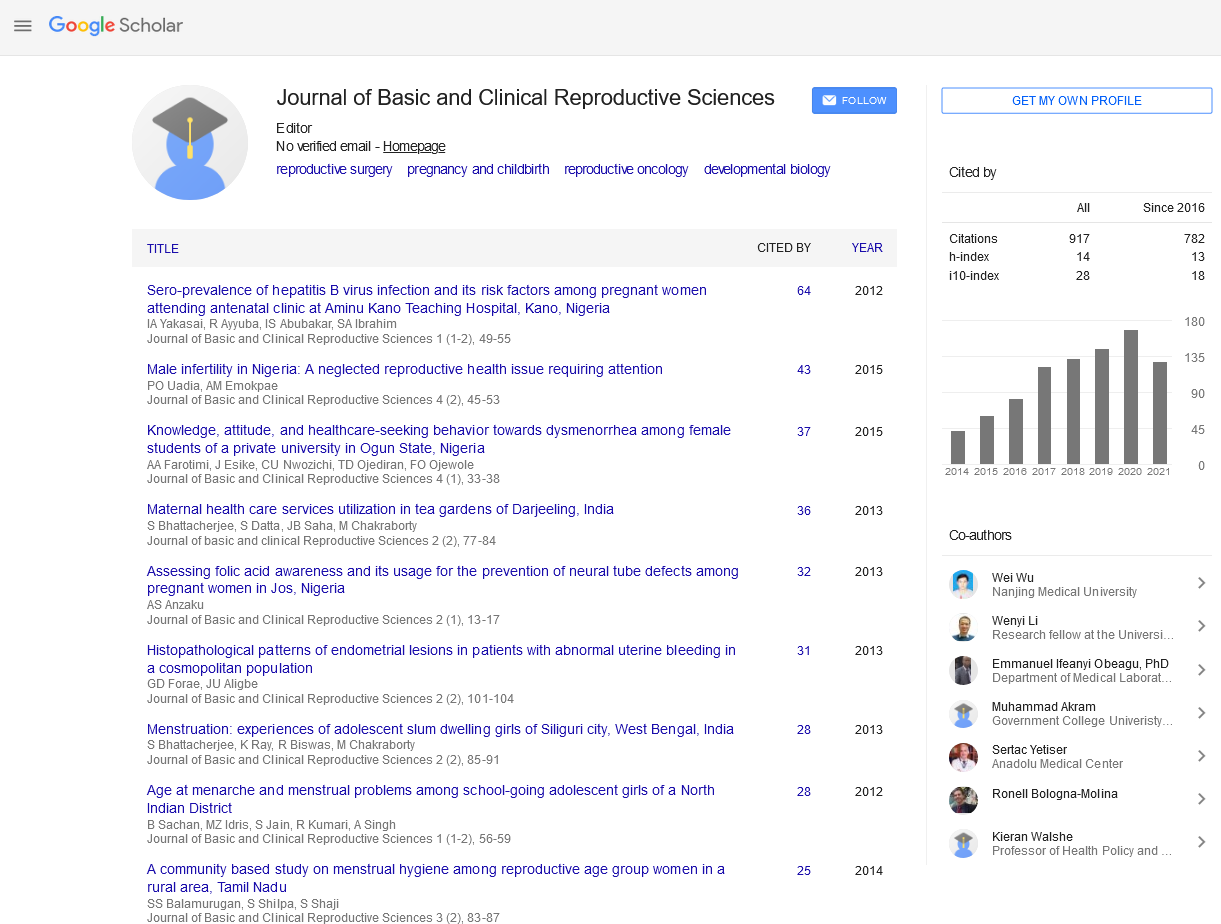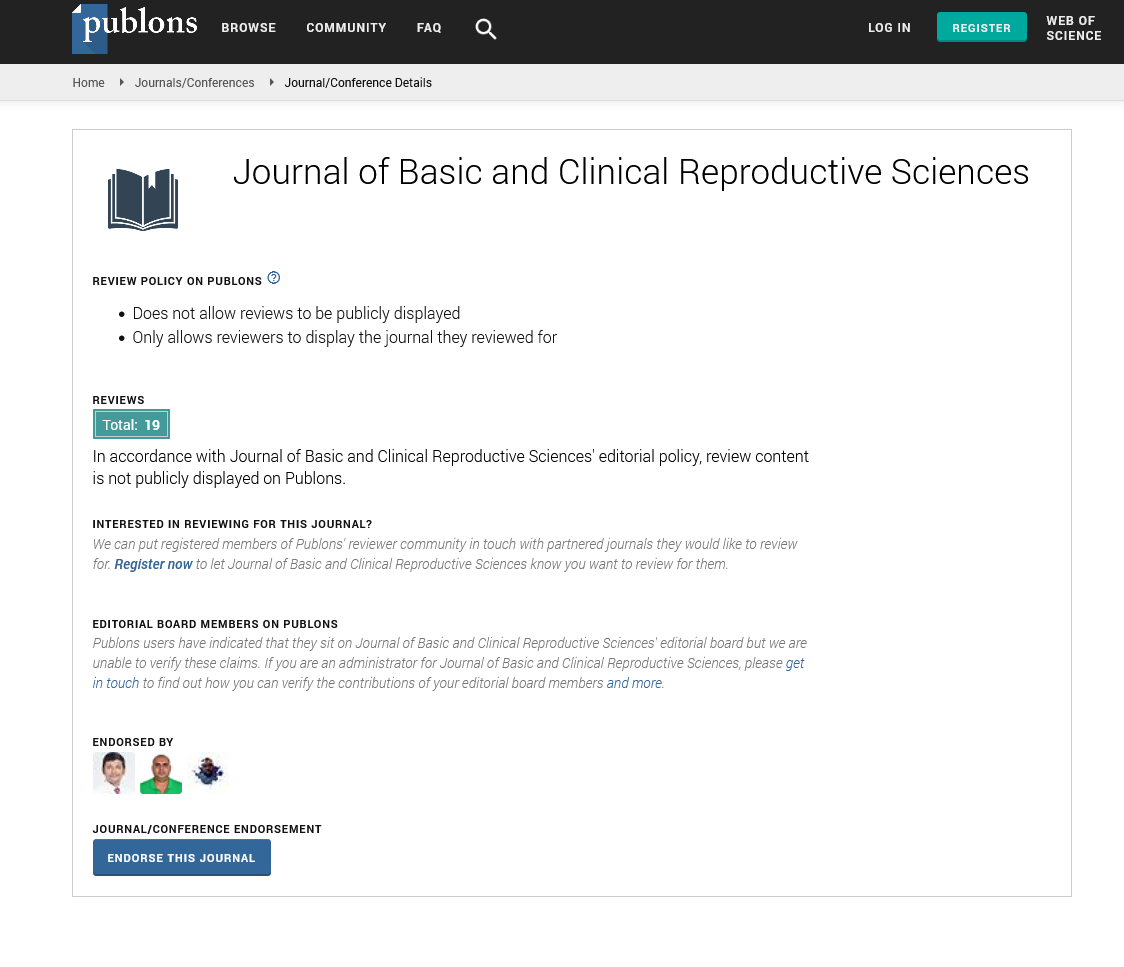Perspective - Journal of Basic and Clinical Reproductive Sciences (2023) Volume 12, Issue 2
Importance of Maternal Fetal Medicine in Healthy Pregnancy
Received: 29-Mar-2023, Manuscript No. JBCRS-23-106683; Editor assigned: 31-Mar-2023, Pre QC No. JBCRS-23-106683 (PQ); Reviewed: 14-Apr-2023 QC No. JBCRS-23-106683; Revised: 21-Apr-2023, Manuscript No. JBCRS-23-106683 (R); Published: 28-Apr-2023
This open-access article is distributed under the terms of the Creative Commons Attribution Non-Commercial License (CC BY-NC) (http://creativecommons.org/licenses/by-nc/4.0/), which permits reuse, distribution and reproduction of the article, provided that the original work is properly cited and the reuse is restricted to noncommercial purposes. For commercial reuse, contact reprints@pulsus.com
Description
Maternal-Fetal Medicine (MFM) is a specialized branch of medicine that focuses on the comprehensive care and management of high-risk pregnancies. With a primary goal of promoting the health and well-being of both the mother and the developing fetus, MFM plays a crucial role in identifying, monitoring, and treating potential complications that may arise during pregnancy. This article explores the field of Maternal-Fetal Medicine, its importance in modern healthcare, and the various interventions and technologies used to safeguard the health of pregnant women and their unborn babies.
Pregnancy is a transformative and delicate period in a woman’s life, and ensuring the health and safety of both mother and baby is paramount. Maternal-Fetal Medicine specialists, also known as perinatologists, are obstetricians with advanced training in highrisk pregnancies. They work closely with other healthcare professionals to provide specialized care for women who may have pre-existing medical conditions, pregnancy-related complications, or multiple gestations. Maternal-Fetal Medicine specialists play a vital role throughout the entire pregnancy journey. They collaborate with obstetricians and primary care physicians to identify high-risk pregnancies, evaluate potential risks, and develop individualized management plans. This proactive approach allows for early intervention, close monitoring, and timely treatment, minimizing the risks and optimizing outcomes.
Maternal-Fetal Medicine specialists are equipped to manage a wide range of conditions and complications that can affect the health of the mother and fetus. Some of the common areas they focus on include pre-existing medical conditions Women with pre-existing conditions such as diabetes, hypertension, heart disease, autoimmune disorders, or kidney disease require specialized care to ensure their conditions are well-managed during pregnancy. Maternal-Fetal Medicine (MFM) specialists address complications like gestational diabetes, preeclampsia, preterm labor, placenta previa, placental abruption, and fetal growth restriction. Their expertise allows for accurate diagnosis, ongoing monitoring, and appropriate intervention to minimize risks. Women carrying twins, triplets, or higher-order multiples are at increased risk of complications. Maternal-Fetal Medicine specialists closely monitor fetal growth, manage potential complications like twin-to-twin transfusion syndrome, and make decisions regarding the timing and mode of delivery.
Maternal-Fetal Medicine utilizes various advanced technologies and interventions to assess, diagnose, and treat high-risk pregnancies. Ultrasound plays a central role in MFM, enabling detailed visualization of the fetus, placenta, and amniotic fluid. It aids in identifying structural abnormalities, monitoring fetal growth, assessing amniotic fluid volume, and guiding procedures such as amniocentesis. Genetic screening and counselling Maternal- Fetal Medicine specialists offer genetic screening tests, such as Non-Invasive Prenatal Testing (NIPT), which can detect chromosomal abnormalities like Down syndrome with a high degree of accuracy. They provide comprehensive counselling to help parents make informed decisions regarding further diagnostic tests or treatment options.
In certain cases, Maternal-Fetal Medicine specialists may perform fetal interventions to address specific conditions. These may include procedures such as fetal blood transfusion, fetal surgery, or shunting to treat hydrocephalus or other fetal abnormalities. Maternal interventions: Maternal-Fetal Medicine specialists also provide interventions to optimize maternal health during pregnancy. They may prescribe medications, manage maternal conditions, or perform cerclage procedures to prevent preterm labor. Maternal-Fetal Medicine involves a multidisciplinary approach, with healthcare professionals from various specialties working together to provide comprehensive care. Maternal-Fetal Medicine specialists collaborate with obstetricians, neonatologists, genetic counsellors, and other specialists to ensure the best possible outcomes for both mother and baby.
Furthermore, patient support and education are integral components of Maternal-Fetal Medicine. The emotional well-being of the mother is acknowledged, and support systems are put in place to address any anxieties or concerns. By fostering open communication, MFM specialists empower women to actively participate in their care and make informed decisions throughout their pregnancy journey. Maternal-Fetal Medicine plays a pivotal role in safeguarding the health and well-being of pregnant women and their unborn babies. Through early identification, close monitoring, and tailored interventions, MFM specialists strive to optimize outcomes and mitigate risks associated with high-risk pregnancies. With the aid of advanced technologies and a collaborative approach, Maternal-Fetal Medicine continues to evolve, providing expectant mothers with the highest standard of care during this transformative period in their lives.


